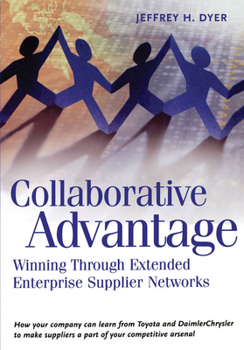Collaborative Advantage: Winning Through Extended Enterprise Supplier Networks
Select Format
Select Condition 
Book Overview
Why has Chrysler been twice as profitable as GM and Ford during the 1990s even though it is a much smaller company with plants that are less efficient than Ford's? Why does Toyota continue to have substantial productivity and quality advantages long after knowledge of the Toyota Production System has diffused to competitors? The answer, according to Jeff Dyer, is that Toyota and Chrysler have been the first in their industry to recognize that the...
Format:Hardcover
Language:English
ISBN:0195130685
ISBN13:9780195130683
Release Date:November 2000
Publisher:Oxford University Press, USA
Length:224 Pages
Weight:0.95 lbs.
Dimensions:0.8" x 6.3" x 9.6"
Customer Reviews
3 ratings
Success through suppliers
Published by Thriftbooks.com User , 21 years ago
The pursuit of knowledge that gives us an understanding of factors that determine success in the market place has always considered "the firm" as the unit of analysis. This has been the case with microeconomics, game theory, competitive strategy and many such specialized areas of research. Cartels that manipulate supply and prices are perhaps an exception to this rule. If, instead of considering the firm as the unit, we consider a group of firms teaming together to collectively provide value to the customer and succeed as a unique identity as a unit of analysis, the methodology to understand competition would undergo a paradigm shift. This book is precisely about this concept as applicable to the automobile industry.In the early half of the last century it was possible to go to the countryside for a picnic in a Ford Model T car, disassemble and reassemble it with a simple wrench and drive back home in the evening. Today we need computers to diagnose even a simple problem under the hood of cars tailor made to suit individual needs. Given the increase in complexity, explosion of technology and customer preferences, it is impossible for a single firm to ever think of manufacturing even half the components. (River Rouge will be remembered in history as the most ambitious plan of an automotive giant to make all parts of the automobile - including steel and timber from within the company. At best a fairy tale for kids of the twenty first century!). This book is the summary of an excellent research study of the automobile industry in the 1990's with focus on Toyota and Chrysler. These companies have significantly different "governance structure" (the proportion of parts made in-house, procured from partner firms, and from arms'-length suppliers) from their competitors- GM and Ford. The firms that have a higher proportion of parts that are bought from partner suppliers have a clear edge over competitors that use arm's-length suppliers for the same parts. Extensive data has been collected, analyzed and tested to substantiate the statements made in the text.Three characteristics that distinguish between partner suppliers from arm's length suppliers- Dedicated asset investments, Knowledge sharing routines and Inter-firm trust form the virtuous triangle that make these partnerships succeed. The results of such partnerships show clearly in tangible terms - Higher profitability per vehicle, better quality, faster time to market, and more new models for customers; the key parameters that enable Toyota and Chrysler to drive at top speed. "It 's not the big that eat the small but it's the fast that eat the slow".Taking lessons from Toyota, Chrysler adopts concrete programs to consolidate its suppliers, integrate and partner with them to deliver higher value at lower cost to the customer. Though this research is restricted to the automobile industry, the fundamental principles of "extended enterprise" can be extended across industries.Highly recommended for all ma
A Masterpiece
Published by Thriftbooks.com User , 23 years ago
Having followed Dyer's other research, I think that this is a theoretically elegant piece of work. He builds further on his pieces in SMJ (with Singh from Wharton) and AMR and illustrates the concepts of relationship-based assets in firm networks. The running exemplar has he uses (Toyota) illustrates his theoretical arguments quite elonquently. The book also highlights the limitations of his concept of collaborative advantage, and his closing chapter illustrates how cultural differences (here with Benz) can keep this strategy from becoming reality. This book is not for folks looking for cut-out recipies. This book is a MUST for researchers and managers who like to think instead of searching for cookbooks! The concluding chapter is a gem because it highlights our gaps in knowledge. This is an excellent book, and having read Dyer's other works, it's high quality comes as very little surprise. Buy, own, read, reread, and profusely highlight your own copy! VERY highly recommended.
Highly Recomended!
Published by Thriftbooks.com User , 23 years ago
Jeffrey Dyer, an accomplished scholar and management teacher, has developed a cogent and sophisticated theory of extended enterprise management based on a wealth of empirical data from the history of Toyota in Japan and from his six-year study of Chrysler Corp. before its merger with Daimler-Benz. Beyond being a detailed and rigorous case study of the automobile manufacturing industry, Dyer's book presents an extremely valuable model for vertical integration. His model can be applied to other complex product industries, though he is honest about the limits of its applicability. This book provides a clear, effective blueprint for achieving value-chain collaboration. We [...] recommend it to consultants, executives in complex product industries and leaders in firms that supply components or materials. If you always suspected you were part of a greater whole, now you can be sure.




